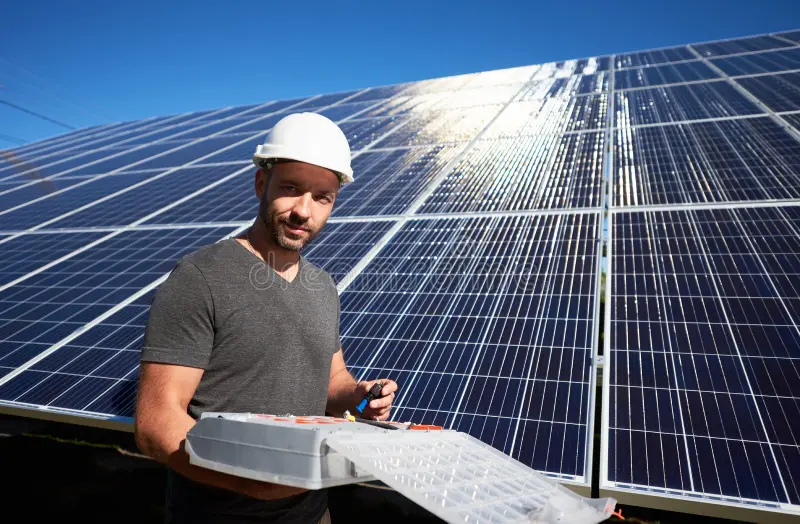As the world moves towards renewable energy, solar panels have emerged as a popular choice for homeowners looking to reduce their energy costs and carbon footprint. One crucial factor that determines the effectiveness of a solar energy system is the efficiency of the solar panels. In this article, we’ll explore how solar panel efficiency impacts your energy savings, drawing from personal experiences and an analytical perspective to help you make informed decisions.
Understanding Solar Panel Efficiency
What is Solar Panel Efficiency?
Solar panel efficiency measures the ability of a solar panel to convert sunlight into usable electricity. It is expressed as a percentage, indicating how much of the sunlight hitting the panel is transformed into electrical energy. For example, a solar panel with 20% efficiency converts 20% of the sunlight it receives into electricity.
Factors Affecting Efficiency
Several factors influence the efficiency of solar panels, including:
- Material Quality: High-quality materials, such as monocrystalline silicon, typically result in higher efficiency.
- Manufacturing Technology: Advanced manufacturing processes can enhance the performance of solar panels.
- Panel Design: Innovations in design, like bifacial panels, can improve efficiency by capturing more sunlight.
- Environmental Conditions: Temperature, shading, and dirt accumulation can affect the efficiency of solar panels.
The Importance of High-Efficiency Solar Panels
Maximizing Energy Production
Higher efficiency panels generate more electricity from the same amount of sunlight compared to lower efficiency panels. This means that with high-efficiency panels, you can produce more energy, which directly translates to greater energy savings on your utility bills.
Space Considerations
If you have limited roof space, high-efficiency panels are especially advantageous. They allow you to generate the maximum possible power output in a constrained area, ensuring that you make the most of your available space.
Long-Term Financial Benefits
Investing in high-efficiency solar panels can lead to significant long-term savings. Although these panels may come with a higher upfront cost, the increased energy production and subsequent savings on electricity bills can offset the initial investment over time.
Personal Experience: Embracing Solar Efficiency
When I decided to install solar panels on my home, I was initially overwhelmed by the options available. After extensive research, I chose high-efficiency monocrystalline panels despite their higher cost. The decision paid off: not only did I notice a drastic reduction in my electricity bills, but the panels also performed exceptionally well during peak sunlight hours, even in less-than-ideal weather conditions.
How Efficiency Impacts Energy Savings
Energy Output and Savings
The efficiency of your solar panels directly affects the total energy output of your solar energy system. Higher efficiency panels produce more electricity, reducing your reliance on grid power and lowering your monthly energy bills. Over time, these savings can be substantial, especially in areas with high electricity rates.
Return on Investment (ROI)
The return on investment for solar panels is closely linked to their efficiency. High-efficiency panels provide a quicker payback period due to their superior energy production. This means you start seeing financial benefits sooner, making the investment more attractive.
Environmental Impact
Using high-efficiency solar panels not only benefits your wallet but also the environment. By maximizing the amount of renewable energy you produce, you contribute to reducing greenhouse gas emissions and reliance on fossil fuels. This is a significant step towards a more sustainable future.
Analyzing the Cost-Benefit Ratio
Initial Costs vs. Long-Term Savings
While high-efficiency solar panels come with a higher initial price tag, it’s essential to consider the long-term savings they offer. Lower efficiency panels might save you money upfront, but they won’t provide the same level of energy production, leading to higher utility bills over the years.
Financing and Incentives
Many financing options and incentives are available to help offset the initial cost of high-efficiency solar panels. Federal tax credits, state rebates, and other incentives can significantly reduce the overall expense, making high-efficiency systems more accessible.
Energy Independence
High-efficiency panels can help you achieve greater energy independence. By generating more of your electricity needs, you become less vulnerable to fluctuations in energy prices and potential power outages, providing peace of mind and financial stability.
Future-Proofing Your Investment
Technological Advancements
The solar industry continues to innovate, with new technologies emerging to increase panel efficiency and durability. Investing in high-efficiency panels ensures that your system remains competitive and effective, even as technology evolves.
Property Value
Homes equipped with high-efficiency solar panels often see an increase in property value. Prospective buyers recognize the long-term savings and environmental benefits, making solar-equipped homes more attractive in the real estate market.
Making the Right Choice
Assess Your Needs
When choosing solar panels, it’s crucial to assess your specific needs and circumstances. Consider factors such as your energy consumption, roof space, budget, and long-term goals. High-efficiency panels are an excellent choice for those looking to maximize their energy savings and environmental impact.
Consult with Professionals
Work with reputable solar installers who can provide expert advice tailored to your situation. They can help you select the best panels for your home, ensuring optimal performance and maximum savings.
Monitor Performance
Once your high-efficiency solar panels are installed, monitor their performance regularly. Ensure they are clean and free from obstructions that could impact efficiency. Regular maintenance will help you get the most out of your investment.
Conclusion
The efficiency of solar panels plays a critical role in determining your energy savings and overall return on investment. High-efficiency solar panels offer numerous benefits, including increased energy production, long-term financial savings, and a positive environmental impact. By understanding the importance of solar panel efficiency and making informed decisions, you can maximize the benefits of your solar energy system and contribute to a sustainable future.


